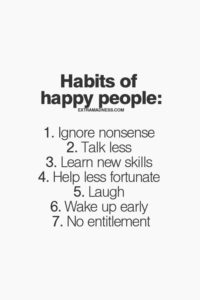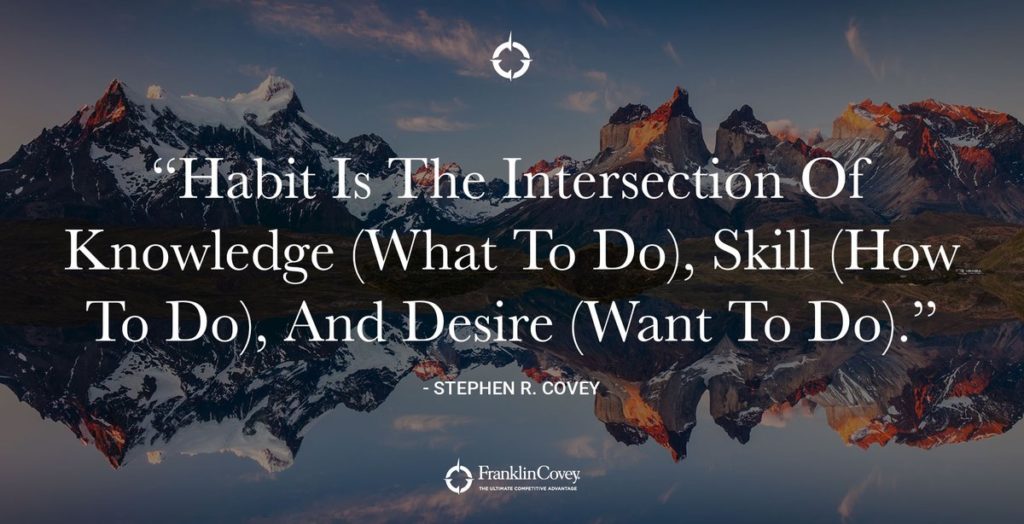by Sam, Management 3.0 Team
Sow a thought, reap an action; sow an action, reap a habit; sow a habit, reap a character; sow a character, reap a destiny.
Stephen Covey paraphrasing Ghandi.
I read an article recently that struck a chord. It was about the difference between habits and goals and why, in order to achieve our goals, we need to create solid habits. It hit me because as much as I love adventure, variety and new experiences, I’ve always relished in needed and often craved my habits.
As author and renowned The New York Times reporter Charles Duhigg said:
Habits are powerful, but delicate. They can emerge outside our consciousness or can be deliberately designed. They often occur without our permission but can be reshaped by fiddling with their parts. They shape our lives far more than we realize—they are so strong, in fact, that they cause our brains to cling to them at the exclusion of all else, including common sense.
We are all creatures of our habits, even if we’re not conscious of the roles they play in our lives. Duhigg says habits make up 40 percent of our waking hours and for the most part, our habits serve to help make us happier at work and more productive.

What resonated most for me in the article was how habits allow us to break things into bite-sized chunks in order to achieve our goals.
It reminded me of elementary school when the teacher would assign tests and assignments for the weeks and months ahead. I remember everyone would write the dates in their agendas, but for some reason that never made sense to me. It was good to know when the tests or essays were due, but it didn’t serve me to open my agenda on the day and see that we had a quiz or a presentation and realize that I’d forgotten to study or prepare.
So instead of just writing down the test or assignment date, I’d fill up the previous days in the agenda with:
- Study for history test
- Start working on science project
- Keep working on science project
This way if the test was on September 5, for example, I’d know that on the 2, 3 and 4 – or however many days were needed to study – I’d have something I needed to do.
If I broke it up and created the habit of studying daily while leading up to it, it’d move me towards my goal of passing – at the very least.
Things have changed a lot since my ‘agenda organization’ days. Rarely do I use paper to jot down what needs to be done, however my fundamental system has stayed in tact:
Breaking down the larger goal into digestible pieces that I can turn into habits.
How we can turn goals into habits so that we can get to where we want to be?

Goal-into-habit Tip #1: Break it down on paper.
When we write things down, they become real. The key with this one, however, is to not only write down your goals, but to write down what actionable steps you need to take in order to achieve them. These steps will become your habits. For example, if you want to finish a 200-page book in a month, decide how many pages you can commit to reading daily. Ten pages every morning, evening or during lunch is a lot more digestible than a bulk sum of 200 pages in 30 days.
Goal-into-habit Tip #2: Make it your happy place.
Create your habit into something that you start to crave. Even if you’re training yourself to do something challenging or outside of your comfort zone, find a way not only to make it enjoyable, but to find peace in it. The aim is to start needing ‘it’, whatever that may be — like reading a book, going for a run, or learning a new language — so that when you don’t do it you’ll feel ‘off’.
Goal-into-habit Tip #3: Choose your habits and enjoy the process.
“Habits aren’t destiny,” said Duhigg. We can choose which habits we want to start. This shouldn’t be a chore. Pick something that excites you and something that’s in line with where you want to go.
Goal-into-habit Tip #4: Start Small.
We’ve all heard this one before and that’s for a reason: When making a change and wanting something to stick, take baby steps. If you want to make exercising a habit, instead of starting with a two-hour run one day, commit to short 15-minute fast walks over a week. The more you do it, the easier it’ll be and the more routine it will become. Once you get into that habit, turn a 15-minute walk into a 30-minute jog and then an hour run, will seem simple.
How do you form good habits? Share your tips below!
For other great articles about habits and goals check out the following:
Photo Credits: Stephen Covey Twitter, Contactually,Estée Janssens

